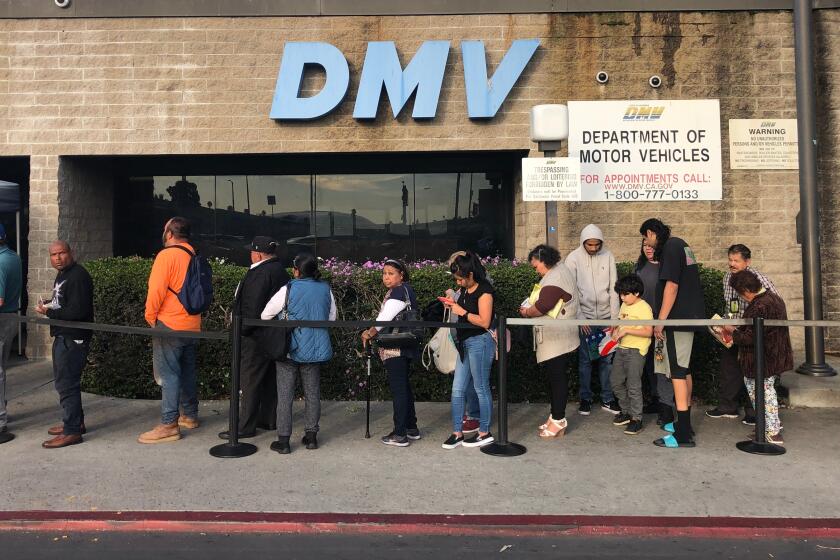California lawmakers take steps to shield immigrants from Trump policies

- Share via
SACRAMENTO — California legislators announced several bills to protect the state’s immigrants being targeted by President Trump’s aggressive new policies, including federal enforcement raids at schools, hospitals and religious buildings.
Members of the influential California Latino Legislative Caucus, made up of 35 Democratic lawmakers, announced the proposals to protect undocumented immigrants as among their top priorities in the upcoming session.
“It’s unfortunate that at the national level, we are seeing deliberate efforts to crash our economy, deport our communities and continue to villainize our Latino communities, and these bills are efforts to combat all of that,” state Sen. Lena Gonzalez (D-Long Beach), caucus chair, said at a news conference at the Capitol on Tuesday.
The legislative package included Assembly Bill 1261 by Assemblymember Mia Bonta (D-Alameda), which would establish a right to legal representation for unaccompanied children in federal immigration court proceedings.
In March, the Trump administration ended a federal contract that provides legal representation to nearly 26,000 migrant children who entered the country without a parent or guardian. The decision was criticized immigration attorneys, who said it would leave the children, many of whom do not read or speak English or are too young to read or speak at all, vulnerable to rapid deportation.
A federal judge in Northern California last week ordered the Trump administration to temporarily restore legal funding for migrant children in immigration court.
A separate bill by Gonzalez, SB 48, would expand existing laws and require school officials to deny federal immigration officials access to school records and school grounds without a judicial warrant. It also keeps local law enforcement from working with U.S. Immigration and Customs Enforcement officials near school grounds.
“California’s school resources and spaces should be dedicated to educating young minds and should never be utilized to tear apart families,” Gonzalez said, adding that immigration actions around schools cause a chilling effect on school attendance.
Legislation proposed by Sen. Sasha Renée Peréz (D-Alhambra), SB 98, would require schools and universities to notify students, staff and parents when immigration officers are on campus.
“This bill will give our communities the peace of mind that they deserve while also maintaining the state’s commitment that schools are safe places,” Renée Peréz said.
The other legislation proposed to protect immigrants included:
- SB 81, sponsored by Sen. Jesse Arreguín (D-Berkeley) requires healthcare providers to deny ICE access to nonpublic areas and refuse disclosing a patient’s immigration status without a warrant.
- AB 421, sponsored by Assemblymember José Luis Solache Jr. (D-Lynwood) would ban state law enforcement from working with or providing information to immigration enforcement within a mile of day-care facilities, places of worship and medical offices.
- SB 635, sponsored by Sen. María Elena Durazo (D-Los Angeles) would keep issuers of street vendor permits from requiring fingerprinting or asking applicants about their immigration status or criminal history.
- SB 294, sponsored by Sen. Eloise Gómez Reyes (D-Colton) would require employers to post a notice to inform employees of their labor and civil rights when interacting with law enforcement on the job, and to notify the employee’s emergency contact if they are arrested or detained.
The Trump administration said in January it would allow immigration enforcement to make arrests in “sensitive locations” such as schools, places of worship and hospitals, sites protected from ICE for the last 30 years.
President Trump, in his first days in office, has released a series of executive orders that will reshape the country’s immigration system. We lay out the key changes.
“Criminals will no longer be able to hide in America’s schools and churches to avoid arrest. The Trump Administration will not tie the hands of our brave law enforcement, and instead trusts them to use common sense,” a Department of Homeland Security spokesperson said in a January statement announcing the policy change.
Aside from issues related to immigrants, the package of legislation supported by the Latino caucus included a bill to prevent silicosis, a permanent lung disease caused by inhaling silica dust in stone fabrication workplaces, through worker education and safety regulations.
The sponsor of SB 20, Sen. Caroline Menjivar (D-Panorama City), said that 98% of people diagnosed with silicosis since 2019 were Latino, and that virtually all were male, according to the state’s silicosis dashboard.
The funding requests suggest Medi-Cal costs are running as much as $6.2 billion above state estimates from last summer at a time when California has opened up eligibility to undocumented immigrants and is experiencing higher than expected enrollment and pharmacy costs for the program in general.
The caucus also reaffirmed a promise to maintain funding for Medi-Cal, the state’s healthcare program that insures 15 million low-income Californians and has run billions above estimates since last summer. Gov. Gavin Newsom asked the Legislature last month to approve an additional $2.8 billion through June to support the program, which opened enrollment to immigrants regardless of residency status.
The rising costs of the program were not to blame on immigrants and the Latino community, Gonzalez said during the news conference. Legislators are instead looking to understand other contributing factors, such as increasing drug costs and long-term care.
“We need to talk about those things in the full narrative,” she said.
More to Read
Sign up for Essential California
The most important California stories and recommendations in your inbox every morning.
You may occasionally receive promotional content from the Los Angeles Times.













